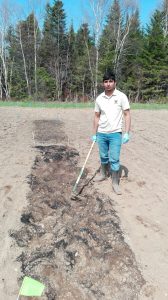The Importance of Soil Carbon for Healthy Plants
Spring is surely coming and no doubt you are already looking at seed catalogues and planning your gardening activities for the coming growing season. If you don’t mind me asking… What are your favourite seeds? Hit reply and tell me what you plan to grow this year. I am interested and as a thank you for reaching out to me I will send you a coupon for 50% off on your next BioChar order. Now on to our topic about soil carbon…
As I mentioned in our first newsletter, biochar plays an important role for soils that have lost organic carbon. Biochar also helps to maintain the organic carbon at a healthy level between additions of compost. In this newsletter I am sharing three informative links that I think will greatly add to your understanding of soil carbon: a BBC podcast, a vimeo video, and a PDF that provides further information about the benefits of biochar composting and related research references – currently a hot topic in the biochar field. Continue reading to view these items…

- This BBC podcast features soil experts speaking about the importance of paying attention to soil carbon for plant productivity, health, and the nutrition value of garden produce. http://www.bbc.co.uk/programmes/b08g5531 (27 min.)
- This second link takes you to a video called “Soil Carbon Cowboys” which formed much of my thinking on this topic and is referred to in the preceding BBC podcast: https://vimeo.com/80518559 (12 min.)
- Last of all, this document generated by the IBI highlights how using biochar in making compost is a very recent research topic that is gaining momentum at universities and agricultural institutions around the globe: http://www.biochar-international.org/sites/default/files/Compost_biochar_IBI_final.pdf (5 p.)
Watch for our next newsletter to learn more about how any soil type can be improved for healthy plant growth. Topics relating to healthy soil microbial ecosystems, soil organic carbon, composting, compost teas, mulching, and more will be discussed. Each newsletter will include information about current research relating to soil health along with open access webinars, videos, and podcasts.
Copyright ©_2017 AirTerra, All rights reserved.
Comments
Leave a Reply

My question is what is the optimal size of the charcoal to be ground. Thank you for these links educating all of us is valuable.
The optimum particle size for biochar for soils is 1mm to 5mm.
Hi Rob,
So happy to have found your biochar. I am using many different biochars in collaboration with two agronomists in my tests to find an industrial Seed-Ball recipe. Your biochar is certified and that’s what I need. I also like your ecological views.
My website is totally outdated but at least it gives an idea from where that project started. I am presently preparing a complete reset of the SeedTheGlobe project.
I am planning to use herbs and flowers and some “ancient” vegetables in the Seed-Balls tests.
It’s nearly ready, my present Seed-Ball recipe is very advanced. I also identified or designed all the machinery I need to make a few million of these Seed-Balls. I also have Organic Certified land to use for testing (other locations are in negotiation).
May be we could have a conversation? I am in Montreal.
Have a nice day
Sylvain Picker
cell.: 438-937-8422
Hi Rob! What am I growing…always tomatoes cherry, paste and eating in a popup tent. I am trying pumpkins for the first time, and red fife winter wheat. Beets, peas, swiss chard, kale, rhubarb, beans -fava, romano, regular, carrots, garlic maybe some herb. I generally use rock dust, bat/chicken guano, but came across another gardener who had massive chard, and he used bio char. So now I am on a quest for the stuff. I am in the far far corner of a huge allotment and so trying to make my soil healthy with what I have. It has been a very rainy spring here in BC but the garden is packed with worms more than I remember ever seeing. I will send you pictures when I get some good specimens. Your in my favorites!
Leslie,
Your garden sounds wonderful. To get the best results from biochar, it is necessary to coordinate it with adequate nutrients and microbial culture. Biochar makes a wonderful habitat for beneficial bacteria and fungi. Biochar also helps to keep the nutrients available throughout the heavy rain seasons, maintaining a well oxygenated soil structure.
Best results come when biochar is blended into a rich compost and simply top dressed onto vegetable or flower beds.
Keep me posted on how it all works out this spring and summer.
Cheers,
Rob